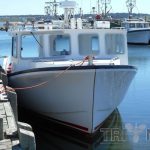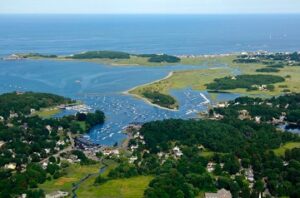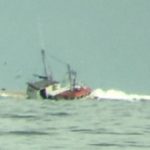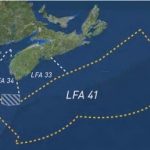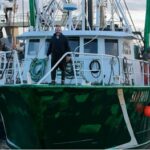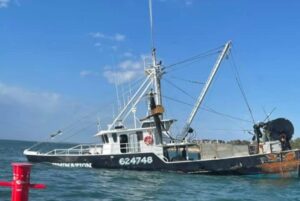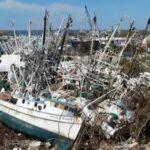Tag Archives: lawsuits
On US coast, wind power foes embrace ‘Save the Whales’ argument
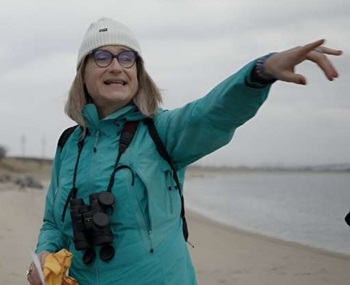 Whether from real concern for marine animals or doubts about renewable energy, the anti-wind power movement has been growing along the US East Coast, with some trying to blame a surge in whale strandings on the growth of offshore energy projects. Their attempt to link the two seems to be resonating, despite what scientists say is a clear lack of evidence. When Lauren Brandkamp and her team from the nonprofit Whale and Dolphin Conservation organization in Massachusetts carry out a rescue on an area beach, one of the first questions bystanders ask is: “Was this wind?” Wind power critics have organized coastal town gatherings, posted “Save the Whales” signs and filed lawsuits in a bid to bury new wind projects under crushing litigation fees. A recent surge in whale strandings or deaths has given them added ammunition. Photos, more, >>CLICK TO READ<< 08:41
Whether from real concern for marine animals or doubts about renewable energy, the anti-wind power movement has been growing along the US East Coast, with some trying to blame a surge in whale strandings on the growth of offshore energy projects. Their attempt to link the two seems to be resonating, despite what scientists say is a clear lack of evidence. When Lauren Brandkamp and her team from the nonprofit Whale and Dolphin Conservation organization in Massachusetts carry out a rescue on an area beach, one of the first questions bystanders ask is: “Was this wind?” Wind power critics have organized coastal town gatherings, posted “Save the Whales” signs and filed lawsuits in a bid to bury new wind projects under crushing litigation fees. A recent surge in whale strandings or deaths has given them added ammunition. Photos, more, >>CLICK TO READ<< 08:41
The federal government is assuming management of salmon fishing in parts of Alaska’s Cook Inlet
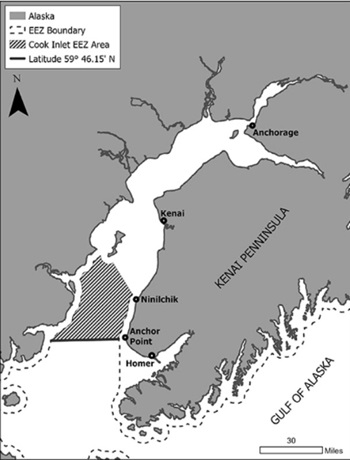 Commercial and recreational salmon fishing in the federal waters of Cook Inlet will resume this summer, but under new management by the federal government, according to a rule made final this week. Until now, the state had managed salmon fisheries in both state and federal waters of the inlet. But the switch in management was ordered by federal courts, as a result of litigation stretching back a decade. The United Cook Inlet Drift Association, or UCIDA, which is made up of commercial salmon fishers, sued the federal government in 2013 for failing to develop a salmon harvest management plan for the federal waters of the inlet. more, >>CLICK TO READ<< 13:11
Commercial and recreational salmon fishing in the federal waters of Cook Inlet will resume this summer, but under new management by the federal government, according to a rule made final this week. Until now, the state had managed salmon fisheries in both state and federal waters of the inlet. But the switch in management was ordered by federal courts, as a result of litigation stretching back a decade. The United Cook Inlet Drift Association, or UCIDA, which is made up of commercial salmon fishers, sued the federal government in 2013 for failing to develop a salmon harvest management plan for the federal waters of the inlet. more, >>CLICK TO READ<< 13:11
Maine Lobstermen’s Association tallies its victories, future risks at annual meeting
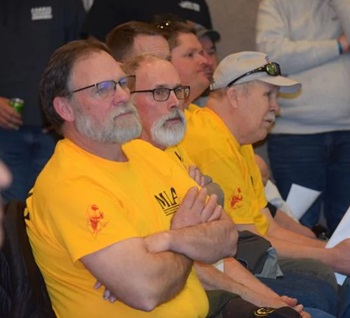 “Every year, there is a new issue facing the industry,” Tristan Porter, president of the Maine Lobstermen’s Association (MLA), said as the trade organization opened its 70th annual meeting during the Maine Fishermen’s Forum on March 1. For lobstermen and the commercial lobster fishery, there are three big issues facing the industry: protecting North Atlantic right whales, maintaining a sustainable fishery and the federal leasing in the Gulf of Maine for floating offshore wind energy — plus the myriad of federal and state regulations and public hearings and, at times, lawsuits, that go with them. 8 photos, more, >>click to read<< 08:44
“Every year, there is a new issue facing the industry,” Tristan Porter, president of the Maine Lobstermen’s Association (MLA), said as the trade organization opened its 70th annual meeting during the Maine Fishermen’s Forum on March 1. For lobstermen and the commercial lobster fishery, there are three big issues facing the industry: protecting North Atlantic right whales, maintaining a sustainable fishery and the federal leasing in the Gulf of Maine for floating offshore wind energy — plus the myriad of federal and state regulations and public hearings and, at times, lawsuits, that go with them. 8 photos, more, >>click to read<< 08:44
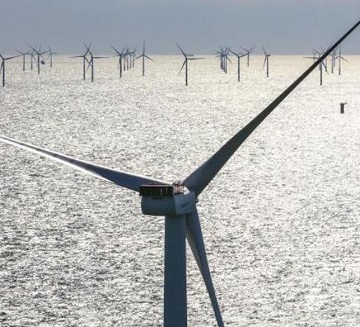
Jersey Shore mobilises against offshore wind power
Soaring costs, high interest rates and clogged supply chains have buffeted the offshore wind power industry as it tries to expand from Europe to the US east coast. Add to these another obstacle: increasingly vocal and organized opponents who live or work along the beachfront. Their campaign threatens to slow down the Biden administration’s push to reach 30 gigawatts of offshore wind capacity by 2030, up from a minimal amount today. They are nowhere more active than in New Jersey, whose own goal of 11GW by 2040 is the most ambitious of any eastern state. “[We] will do whatever it takes to stop this,” said Paul Kanitra, the mayor of Point Pleasant Beach, New Jersey. “If that means lawsuits, we’ll do lawsuits. If that means we literally need to form a flotilla and go out there and stop it ourselves, we’ll do that as well.” The opponents raise fears of harm to marine life and fisheries, and ocean views marred by spinning wind turbines. They have formed groups with names such as Protect Our Coast NJ and Save Long Beach Island. >>click to read<< 16:43
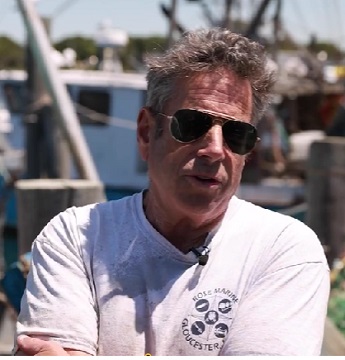
Wind energy expansion raises concerns over fishing industry’s future
The burgeoning development of offshore wind energy along the East Coast is drawing attention to a growing concern: the potential impact on the livelihoods of commercial fishermen who operate in these waters. The collision between the expanding renewable energy sector and the established fishing industry has ignited a debate over the future of these shared waters. While not all fishing organizations oppose offshore wind projects, some fishermen, such as Dave Aripotch in Montauk, N.Y., have expressed fears that their industry is at risk. They argue that their concerns have been overshadowed by the rapid push for clean energy solutions. Video, >>click to read<< 09:18
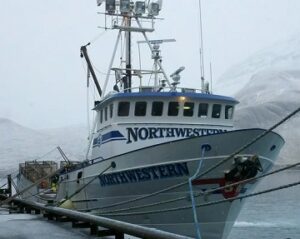
Deadliest Catch: What Happened to the F/V Northwestern?
The only boat to appear in all 19 seasons of the show, the F/V Northwestern is owned by the Hansen family and skippered by Sig Hansen, according to the Discovery Channel’s F/V Northwestern origin story, posted on Youtube. Surely the 124-foot-long fishing boat built in 1977 has weathered some rough seas, but so has the family that owns her. Despite lawsuits, a sexual assault conviction, and more accusations, the Northwestern has remained integral to the livelihood of the family. >click to read< 09:50

Commissioner’s Update – Good News? Cautiously Optimistic
The Center for Biological Diversity, in their case against the National Marine Fisheries Service, has done an about face. In their first filing, they had asked Judge Boasberg to implement new rules to achieve the required risk reduction within 6 months, but their filing last Friday asked the Judge to implement a two-year process to develop and implement those rules. They also asked the Judge to vacate the current Biological Opinion so that it can be rewritten while the new rules are being developed. Why they changed their position is not known, but DMR, NMFS, MLA, MLU and Mass Lobstermen all asked for a similar process that was two years or longer. In any event, this development is good news, but the Judge must agree before this is final. I am cautiously optimistic that he will agree that time is needed, given the complexity and difficulty of what we are facing. We expect a decision on this case in November. >click to read the rest< 14:01

Gulf of Maine: Lawsuits over North Atlantic right whale regulations coming to boil
Lobsterman Brian Cates lives so far at the edge of Maine he can look out the windows of his house and see Canadian boats out in Canadian waters. Cates and other New England lobstermen are worried about how the coming regulations issued by the National Marine Fisheries Service will affect their livelihoods. Cates fishes in disputed waters. There, around the mouth of the Bay of Fundy, there’s a strip of ocean claimed by both Canada and U.S. alike called the grey zone. Cates fishes up against Canadian lobstermen, their traps and lines often getting caught up on one another. And the rules coming down from the federal government are not helping, >click to read< 19:14
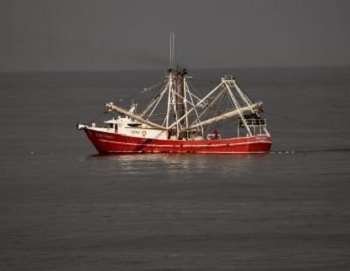
One lawsuit dismissed, another filed against State of North Carolina over fisheries management
The latest suit was filed on Tuesday in state court, the same day another group’s legal action against government officials’ management of marine fisheries in North Carolina was dismissed in federal court. The Coastal Conservation Association of North Carolina, along with 86 North Carolinians, filed their civil action Tuesday against the state in Wake County Superior Court. In an unrelated case, an organization called the North Carolina Coastal Fisheries Reform Group filed a federal lawsuit in August saying regulations that allow large, ocean-going shrimp trawlers to work in the state’s sounds violated the Clean Water Act. >click to read< 08:01

Court Finds American Lobster Fishery Requires Incidental Take Statement for Impacts on North Atlantic Right Whale
As commercial fisheries across the United States continue to adjust operations in the face of new legal requirements, such as the shift from single-species to ecosystem-based management, one challenge in particular has dominated the courts: the Endangered Species Act (ESA). Recent court decisions have vacated commercial longline fishing permits in federal waters off the coast of California that could endanger the Pacific leatherback sea turtle and restored prohibitions on gillnet fishing gear in a known New England feeding ground for the endangered North Atlantic right whale. This trend continued on April 9, when a federal district court judge in Center for Biological Diversity,,,The American lobster fishery is managed cooperatively by the Atlantic States Marine Fisheries Commission and NMFS, >click to read< 14:45
Why is it wrong for the fishermen to bring a lawsuit but is alright for Mr. Shelly’s CLF to profit from lawsuits?
 CLF’s Peter Shelley at Talking Fish wrote: Blowing Up the New England Fishery Management Council. He won’t post the rebuttal comments but we will!
CLF’s Peter Shelley at Talking Fish wrote: Blowing Up the New England Fishery Management Council. He won’t post the rebuttal comments but we will!
Comment on Talking Fish that doesn’t seem to be accepted. Mr. Shelly and CLF make a living from suing NOAA and fishing for dollars. For that they get nonprofit tax status. So the taxpayers pay twice 1) for nonprofit status and 2) because they file so many lawsuits they win by default (a scam all NGOs have perfected). Unlike fishermen who do pay taxes and support local economies. Contrary to Mr. Shelly’s claim the majority of people on the councils are not fishermen, and one of the so called fishermen that is on the council is a paid spokesman for the ENGOs (John Pappalardo).
Can the Sea Shepherds Cult Survive the Lawsuits?
 Ady Gil has become dead-set on rooting out the dishonesty he sees in Watson’s radical conservation organization. He and his own conservation group, Ady Gil World Conservation, are bringing lawsuits against Sea Shepherd and its founder for damages, defamation and fraud – the first of which, concerning the loss of the ship, will likely be decided this summer. The first suit alone could cost SSCS as much as $50m. “These are people who will do anything possible to draw sympathy,” says Gil, who describes Sea Shepherd in an interview as “infested with corruption”. Read the rest here 18:43
Ady Gil has become dead-set on rooting out the dishonesty he sees in Watson’s radical conservation organization. He and his own conservation group, Ady Gil World Conservation, are bringing lawsuits against Sea Shepherd and its founder for damages, defamation and fraud – the first of which, concerning the loss of the ship, will likely be decided this summer. The first suit alone could cost SSCS as much as $50m. “These are people who will do anything possible to draw sympathy,” says Gil, who describes Sea Shepherd in an interview as “infested with corruption”. Read the rest here 18:43
CLF sues NOAA to block openings – “It’s not hypocritical at all,” says Peter Shelley who criticized Coakley for interfering with the federal regulatory process.
The day after Peter Shelley, senior counsel for Conservation Law Foundation, derided Attorney General Martha Coakley’s federal lawsuit to block NOAA’s tight new groundfish catch limits as political “soapbox” posturing, CLF and a litigation partner filed two lawsuits of their own against the National Oceanic and Atmospheric Administration. continued
We’ve given you the N E Lawsuit Palooza Headlines, but these guy’s tie it into a nice tidy package. That’s why they get the Big bucks.
![]() There is no shortage of lawsuit’s in New England. If anything, there’s a glut! All have been in the planning stages, some telegraphed at NEFMC meetings. As always, the lawsuit professional CLF is ready to rip NMFS a new a- hole, because, as Dick Grachek explains to us at his column, it’s what they do! Earthjustice threw down, along with Oceana Incorporated and I’m betting someone else is gonna join the fray.
There is no shortage of lawsuit’s in New England. If anything, there’s a glut! All have been in the planning stages, some telegraphed at NEFMC meetings. As always, the lawsuit professional CLF is ready to rip NMFS a new a- hole, because, as Dick Grachek explains to us at his column, it’s what they do! Earthjustice threw down, along with Oceana Incorporated and I’m betting someone else is gonna join the fray.
Massachusetts Attorney General Martha Coakley also files a law suit against NOAA to block new regulations that threaten the New England fishing industry.
The savingseafood.org guys have put together an excellent rundown of the timeframe and actions unleashing the furor of the reactionary lawyers of the ENGO non-profit opportunists to once again, ignore science and sue the agency that you pay for. For a bunch of clowns that keep talking about climate change, they seem to ignore it when it’s convenient, or doesn’t fit into the finish off the New England fisherman while John Bullard has them on the ropes, thanks to his boss Lois Schiffer, and the undisclosed law that John says he must abide by. Here’s the link to savingseafood.org and its comprehensive analysis.

































